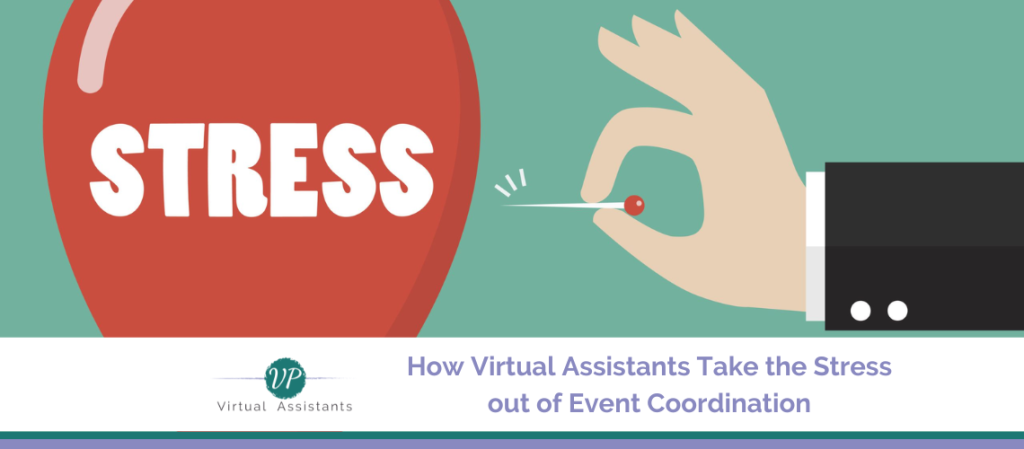Some of the links in this post are affiliate links. This means if you click on the link and purchase the item, we will receive an affiliate commission at no extra cost to you. All opinions remain our own.

Event planning involves juggling a multitude of tasks, from managing vendor communications to tracking guest lists, all while adhering to a tight schedule. The chaos that ensues in the lead-up to an event can feel overwhelming, making the idea of a stress-free, smoothly run event seem elusive.
Enter the game-changer: virtual assistants. With the increasing demand for streamlined event coordination, many planners are turning to virtual assistants to simplify the process and reduce the workload. This article will explore how virtual assistants can alleviate the stress of event planning, allowing organizers to focus on delivering a successful, memorable event.
What is a Virtual Assistant?
A virtual assistant (VA) provides remote support services to businesses or individuals, specializing in tasks like event coordination, customer service, social media management, and more. With their ability to work remotely using technology and communication tools, VAs can help manage various aspects of event planning, offering essential support that allows organizers to focus on big-picture goals.
The Rise of Virtual Event Specialists
In recent years, digital transformation has put virtual assistants at the forefront of event management. These skilled professionals bring a combination of project management expertise and technological knowledge, enabling them to handle complex events efficiently, from inception to execution. Virtual assistants skilled in event coordination leverage tools like event management software, social media platforms, and chat apps to ensure that events run smoothly, keeping attendees engaged and making each event unique and memorable.
Additionally, VAs offer flexibility and adaptability. As technology evolves and trends shift, virtual assistants can seamlessly transition between different event formats, whether small-scale webinars or large virtual conferences, maintaining their efficiency and delivering stellar results.
Essential Tools for Efficient Event Coordination
Virtual assistants use a variety of tools to streamline event planning, improving productivity and ensuring that everything runs without a hitch. Here are some key technologies that empower VAs as expert organizers:
- Event Management Software: VAs use event software to manage the many moving parts of planning, from tracking budgets to organizing guest lists and handling communication.
- Video Conferencing Platforms: With the rise of virtual events, platforms like Zoom or Microsoft Teams allow VAs to maintain seamless communication with clients, team members, and attendees.
- Project Management Tools: Software like Trello or Asana helps VAs stay on top of tasks, deadlines, and team assignments, ensuring timely execution of all event components.
- Social Media Management Tools: VAs can also manage event promotion and attendee engagement on social media, scheduling posts, tracking metrics, and interacting with followers.
- Chat Apps: Platforms like Slack and Microsoft Teams facilitate quick communication between VAs, team members, and vendors, ensuring everyone stays informed and on the same page.
Time Savings and Cost Efficiency
Beyond reducing stress, virtual assistants can help event planners save both time and money. VAs streamline processes to avoid costly mistakes—whether negotiating better deals with vendors or tracking expenses to stay within budget. By eliminating unnecessary costs and optimizing spending, VAs contribute to the financial success of an event.
Furthermore, virtual assistants free up planners by handling time-consuming tasks like data entry or managing guest lists. This improved efficiency allows planners to focus on higher-priority aspects of coordination and even take on more events, leading to increased revenue.
Tailored Experiences: The Power of Personalization
With virtual assistants managing logistics, event planners can shift their focus to crafting personalized, engaging experiences for attendees. VAs can gather and analyze data on attendees’ preferences, helping planners tailor event details accordingly. This level of personalization not only enhances attendee satisfaction but also increases engagement and the overall success of the event.
VAs leverage data and technology to deliver customized experiences that resonate with the target audience, setting them apart from traditional event planning methods.
Looking Ahead: The Future of Event Coordination
As virtual events continue to grow, the demand for tech-savvy virtual assistants will rise. Advances in technology will introduce new tools that will empower VAs to streamline coordination even further. Event management platforms are expected to integrate more seamlessly with other tech tools, making collaboration easier for VAs and event planners.
Virtual assistants also offer the flexibility needed to handle hybrid events, which combine in-person and virtual elements. As the events industry evolves, VAs will continue to play a vital role in ensuring smooth coordination across diverse event formats.
Conclusion
Virtual assistants bring a wealth of skills and expertise to the event planning world. Their ability to leverage technology, streamline processes, and create personalized experiences makes them invaluable to any event planning team. With their help, events can be executed flawlessly, saving both time and costs while delivering exceptional attendee experiences.
Looking ahead, virtual assistants will continue to be a driving force in the events industry, shaping the future of event coordination. For event planners, partnering with a trusted virtual assistant offers a clear path to stress-free, successful events.
